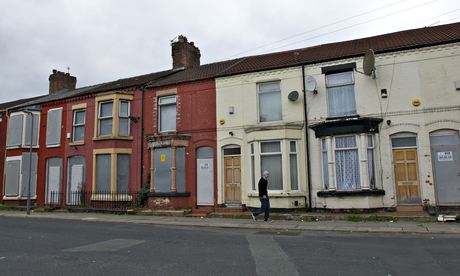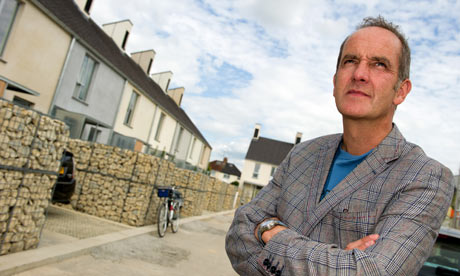In 1975, in her first speech as leader to the Conservative party conference, Margaret Thatcher declared her belief in a "property-owning democracy". She didn't invent the phrase – the 1920s Tory MP Noel Skelton should take the credit for that, and the American liberal philosopher John Rawls picked it up before she did – but it became the most distinctive of all her many distinctive ideas, the one that most succinctly describes the Britain she wanted to create.
Through thrift and hard work, went the theory, ordinary families should be able to buy their own homes. It would give them security, dignity and freedom and liberate them from the nannying of local council landlords. It would make them better citizens, with their own stake in the economic wellbeing of the country, they would have an incentive to contribute to national prosperity. It exemplified her belief that capitalism was good not only for the rich, but for people on modest incomes. As the then environment secretary, Michael Heseltine, put it later: "Home ownership stimulates the attitudes of independence and self-reliance that are the bedrock of a free society."
So Thatcher allowed council tenants to buy their own homes at reduced prices, and sincethe right to buy was introduced, about 1.5m have been bought. She presided over an economy in which house buying became a national obsession and home ownership went up from 9.7m to 12.8m. Fundamental to her idea was that government, which had built between a third and a half of all homes for the previous three decades, should step back. Councils could no longer build council housing. The market would provide. Houses would be built by housebuilders, to use the standard term for the companies that buy land, win planning permission and then (sometimes) put homes on it.
Thatcher's idea is now at a point of crisis. Housebuilders are not building enough houses, and the proportion of people owning their own homes has been falling since 2007. People have long ago found that it does not always make you free to be shackled to a mortgage, still less if you cannot cross the increasingly high threshold into ownership. In London and the south-east, businesses lament the effects on them of expensive housing caused by the lack of mobility of potential workers.
Debt and speculation have been encouraged more than thrift and people who only wanted a home were forced to be gamblers in a turbulent market. The property-owning democracy is not turning out to be democratic, excluding as it does the large minority who don't own homes. In a sick practical joke, people have been encouraged to take on long-term mortgages at the same time that secure lifetime employment, which might pay for them, is disappearing. As for public spirit, with rising house prices goes rising nimbyism, as owners seek to protect their investment from all possible threats, above all the threat of more homes being built nearby that other people might live in.
Over three decades, a culture has been created in which the price of homes colours almost every aspect of life. It affects people's decisions about whether and when to live together, stay together and have children. An economy has been created in which inflation, otherwise frowned upon, is desirable in house prices, even essential. Property values are used as the principal tool of urban regeneration and, when those values fail to materialise, so does the regeneration. The infamous bedroom tax regards a few square metres of spare space as such a great asset that it must be wrenched from the grasp of the undeserving poor. "Values", indeed, is a telling word – we use it more to describe property than anything to do with ethical or social ideals.
It is amazing, beyond satire, that the two biggest stories in housing are on the one hand the bedroom tax and on the other the streets and squares of empty houses in Belgravia and Kensington, bought as investments by owners who rarely visit. At the same time that, when it comes to poor people, vacant rooms are deemed an offence to be expunged, they grow unchecked in the most desirable parts of London.
At almost every level, the market isn't working, from ex-industrial towns in northern England, where the values are too low to justify repairs to existing houses, to the under-supply and high prices in London, where an average home now costs £458,000, or 13 times the median full-time income. Hidden favelas are growing up in suburbs such as Newham and Southall, with unauthorised developments in back gardens and flats occupied at many times the levels for which they were designed.
 Newham, London: favela-style housing is on the increase in suburbs such as Newham and Southall, with severe overcrowding and unauthorised developments in back gardens and yards. Photograph: Newham Council/Archant
Newham, London: favela-style housing is on the increase in suburbs such as Newham and Southall, with severe overcrowding and unauthorised developments in back gardens and yards. Photograph: Newham Council/Archant
A system has been created with a few winners, for sure, but not the people excluded from the market, nor those barely able to pay for their homes, some of whom will drown when interest rates start going up. Even those who bought early enough to have a profit on their home find it to be largely nominal, impossible to realise without removing themselves or their children from the all-important property ladder.
Not even housebuilders are entirely happy, although recent government policies such as Help to Buy and the encouragement of easy credit have helped their share prices rise. They grumble that planning restrictions and regulations make their work unreasonably difficult and that the margins in their business are low. "It is a fantastically hard business," says one of those involved, because of its booms and busts. The most obvious winners were people such as Judith and Fergus Wilson, the Kent-based buy-to-let magnates said to be worth £180m. But here too there are losers – the people who got their fingers burned when this particular market crashed.
As Danny Dorling, in his recent book All That is Solid: The Great Housing Disaster has pointed out, the home is now seen as a commodity, as a unit of investment to be traded up or down. Attachment to a place, or the interconnectedness of units to make a community, is given little value. The pursuit of ideals, the idea of social or architectural betterment in the provision of housing, has all but disappeared.
Early in the last century, when Arts and Crafts architecture was flourishing and the first garden cities were being planned, the German architect Hermann Muthesius publishedThe English House, which was based on the premise that this country was particularly good at domestic architecture and that countries such as Germany should look and learn. It is unlikely anyone would want to do this now, as new British homes have, as well as the highest prices, the meanest dimensions to be found anywhere in Europe. What we have instead are a series of distinctive if largely inadvertent types, created by a warped market, which might be summarised thus:
Rural eyesore
An attempt to squeeze housing units into places where people want to live (the countryside in southern England), but the people there already don't want any more. Compromise ensues, in which new houses take on a huddled, crowded air and are given a traditional style to mitigate their intrusion. Making a new place with positive and exceptional qualities is out of the question, as all the developers' creative energies have gone into wrestling with the planning system to get their permission.
Investment silo
In London and some other big cities, dense apartment blocks are built with the primary purpose of creating vehicles for investment. Sometimes they are towers. In the previous decade, these developments were primarily aimed at British-based buy-to-let investors; currently the main target are overseas buyers. These projects typically have just enough decking, white paint and glass balustrades to allow good-looking young couples to be photographed inside them holding glasses of white wine, such that the adjectival nouns "luxury lifestyle" can be attached. They also have enough odd angles, or multicoloured cladding, to claim the adjective "iconic".
Affordable silo
Similar to an investment silo, to the extent that housing associations are now the main providers of affordable housing, and are also pressured to behave more and more like property developers. Their products therefore look increasingly like those of developers, although with some reductions in the luxury lifestyle and "iconic" elements. On the other hand, they tend to be built with better standards of space, as housing associations have to follow stricter rules than private developers.
Student silo
Exploiting loopholes in the planning and regulatory systems, which make fewer demands on student housing than other types, property companies have in recent years rushed into this market. Among the attractions of students to developers is that they can be put into even smaller spaces than anyone else. The typology is similar to other types of silo, but with still less in the luxury lifestyle department.
Northern disaster zone
 Parts of Liverpool and Gateshead have been demolished by the government, the old streets replaced with smaller numbers of new homes. The result? The uprooting of people who wanted to stay put and zones of demolished and empty buildings. Photograph: Nigel R. Barklie/REX
Parts of Liverpool and Gateshead have been demolished by the government, the old streets replaced with smaller numbers of new homes. The result? The uprooting of people who wanted to stay put and zones of demolished and empty buildings. Photograph: Nigel R. Barklie/REX
Parts of Liverpool or Gateshead, for example: places afflicted by the last government's Housing Market Renewal Pathfinder project, where about £2bn of public money was spent buying up streets in areas of low value, demolishing them, and replacing them with smaller numbers of new homes. The theory was that, under the laws of supply and demand, reduced supply would raise values. The reality was the breaking up ofcommunities, the uprooting of people who wanted to stay put and devastated zones of demolished and empty buildings.
Overcrowded London
Flats and backyards adapted to house as many people as possible.
Empty Belgravia
Extraordinarily expensive houses owned by people with properties in several other countries, such that they are usually unoccupied. Often also iceberg houses, with multifloor basements expensively created underneath, to create further quantities of void.
Nonexistent new town
Successive governments are lured to the attractive idea of the new town, as it enables large numbers of homes to be built while annoying fewer residents than if they have been spread over a wider area. It appeals to politicians' love of a visible gesture. The same governments then fail to provide the infrastructure and planning to make these towns happen. The last administration promised both a new city in the Thames Gateway, to the east of London, and a series of "ecotowns". Very little of either appeared.
It is not in fact so difficult to create good modern housing. There are well-known examples in continental Europe, often cited in discussions of the subject, such asHammarby Sjöstad in Stockholm, Vauban in Freiburg, and Borneo Sporenburg in Amsterdam. Peter Hall, the planning expert whose recent book, Good Cities, Better Lives, explores the best European examples, says that there is an "extraordinary similarity" between these schemes: they have good public transport, from which all homes are within easy walking distance, and "a good disposition of semi-public spaces", such as playgrounds and shared gardens.
 St Andrews in East London: housebuilder Barratt, not always a byword for design quality, is responsible for this project with its emphasis on robust detailing, balconies and shared space.
St Andrews in East London: housebuilder Barratt, not always a byword for design quality, is responsible for this project with its emphasis on robust detailing, balconies and shared space.
Nor is Britain incapable of decent developments. Barratt, a housebuilder not always associated with design quality, has built the St Andrews and Barrier Park projects in east London, albeit only after prodding from the London Development Agency, the public body that sold it the land. Richard Lavington, one of the architects of these developments, says that the aims were "to put a balcony on every unit, and to create a positive interface between private and public", by which he means placing family homes close to shared open spaces and streets in such a way that they might readily use them. He also sought "clear, robust detailing" that would be "straightforward to build".
Again, this is not complicated stuff and the developments live up to these claims. Cognoscenti of new housing will also know of fine, small-scale projects by the developers Crispin Kelly of Baylight and Roger Zogolovitch of Solidspace. Kelly says: "Big windows and high ceilings are a start, and lack of fussiness – having the confidence to do things simply." Inside, he likes bonus spaces – on a stair landing for example – where a child might do homework, and outside something as basic as a bench that encourages neighbours to meet. Like Kelly, Zogolovitch likes undesignated spots "where you might set up a cello or an easel or write a novel". He uses design to make small spaces feel larger and give them personality.
 Kevin McCloud at The Triangle housing project in Swindon. Photograph: Professional Images
Kevin McCloud at The Triangle housing project in Swindon. Photograph: Professional Images
In Swindon there is The Triangle, created with the help of Kevin McCloud's company Hab, which also stresses the importance of shared space and simple design. And, when you ask for examples of good new housing, you keep being referred back to Cambridge. Here is Accordia, which won the Stirling prize in 2008, and the university-backed £1bn plan to create 3,000 homes, half of them for key workers, on 150 hectares in the north-west of the city. Also in Cambridge are developments such as the "Scandinavian-style"Seven Acres, by the multinational construction company Skanska, which again is based on the virtues of simplicity and shared space.
But these bright spots are too rare and require favourable conditions, such as having a TV personality or an ancient university to back them. They tend to be in places such as London or Cambridge, where prices rise faster than elsewhere. This helps to pay for more quality, but by definition makes it harder to achieve.
The housing crisis is one of both quantity and quality. Some 250,000 new homes a year are said to be needed, but after 2008 the number fell below 100,000, mostly built by private housebuilders but also by housing associations. In the postwar peak in the late 60s, more than 400,000 were created a year, many of them by the councils later banned from building by Margaret Thatcher. Meanwhile, the private sector built at a reasonably steady rate from the late 1950s on, between 150,000 and 250,000 a year. Until the 2008 crash, that is, when output plummeted to a level not seen for half a century.
Blame for this lack of supply is usually placed on the planning system. There is nowhere in southern England for new housing to go or, rather, nowhere where voters and therefore politicians want it to go. Suggestions of building anything on the green belt bring accusations of desecration of a national treasure and similarly with rural locations further from big cities. The theory that brownfields, that is ex-industrial sites, could answer all housing need has proved challenging in practice. Such sites are not always where people want to live.
Suggestions for fixing the problem include, as always, the new town or, as George Osborne likes to call it, the "garden city". He used the term when repackaging existing proposals for Ebbsfleet in Kent, and presenting them as his invention, but his duplicity should not obscure the possibility that it might be a good idea. Peter Hall passionately believes that the principal hope for housing is building new towns and town-size extensions to existing cities. The new towns created in the 1960s, of which Milton Keynes is the biggest and best known, may have become the butt of patronising jokes, but, says Hall, "were really rather successful". They did their job of relieving pressure and "all the evidence shows that people like living there".
Another idea is to fit more homes into London, which is several times less densely populated than, for example, Paris. Another is to encourage people to build their own houses, which currently accounts for a minute proportion of the total. Another, popular with the current government, is the "neighbourhood plan". Here, local communities (usually rural) put together their own proposals for development so that some of the proceeds go to shared benefits and growth is no longer an aggressive intervention by outsiders. It might also help if we moved away from the preoccupation of home ownership with the help of decent properties for private rent. Michael Heseltine once said that "there is in this country a deeply ingrained desire for home ownership", but in 1900 90% of homes, at almost every level of price, were rented.
All these suggestions have merit and the answer is almost certainly to embrace all of them and more. We have to go from our current culture, where new housing is treated as pollution, and something to be squeezed through the planning system with the greatest difficulty, to one where it is seen as a positive asset. There is a vicious circle – new development is poor because it takes so much effort to overcome objections and people object to it because it is poor.
But none of these ideas will happen without the thing the coalition has been least willing to employ, which is active and forward-looking public intervention. It is hard to build a new town, or a well considered rural expansion, without things such as compulsorily buying land, paying professionals to plan it or providing transport. As Dickon Robinson, formerly of housing association the Peabody Trust puts it: "The market has failed. It's time to put some controversial ideas out there."
The compulsory purchase by government from private landowners sounds communist, but it was used (for example) in the "renewal" of northern cities. It is just that politicians are more reluctant to wield it in Kent than in Gateshead. If we are sceptical about the power of planners to achieve their objectives, we only need to look at the Netherlands. There, they had a similar scale of housing shortage, in proportion to the country's size, to the one that has been diagnosed in Britain for the past 15 years. Unlike Britain, they fixed it, by building nearly half a million new homes.
Planning apart, there is a deep flaw with the idea that the market alone will meet all the country's housing needs. The problem is not only to do with the numbers supplied, but with how much each home costs and housebuilders cannot be expected to lead a process that results in the value of their product going down. They would rather sit on their land until such time as its price goes up, which means that some other agency has to do what they won't, which means, in effect, that the government has to intervene more actively in promoting building – by acquiring land, producing considered plans for its development, and then promoting such development.
Given that in much of Britain the price of homes is high, a slow deflation might be desirable; the ideal could be that prices stay the same, so that they gently fall in real terms. But the coalition's big idea is the opposite. With Help to Buy, changing pension rules and other measures, they have stimulated demand without a corresponding increase in supply, such that prices go up further. As the Financial Times has said, this is economically illiterate. It would be a useful first step to reverse these policies.
We are now at a moment similar to the 1970s, when ideas about housing that had lasted a generation stopped working. Then it was the legacy of Clement Attlee's postwar government, which believed in massive state provision of housing, but which ended up restricting freedoms and too often creating homes people didn't like. Thatcher's policies were a necessary corrective, and had real benefits, but now they too are failing. It is time for something new.
It's not easy to champion planning, as it tends to summon images of faceless bureaucrats and grandiose visions gone wrong. But, as Hermann Muthesius recognised in the early 1900s, and as Peter Hall argues about 1960s new towns, it is not un-British to plan and design new communities well. The national dependency on high house prices has, in its effects, become an economic, social and cultural disaster. Active intervention is needed. As someone once said, there is no alternative.









